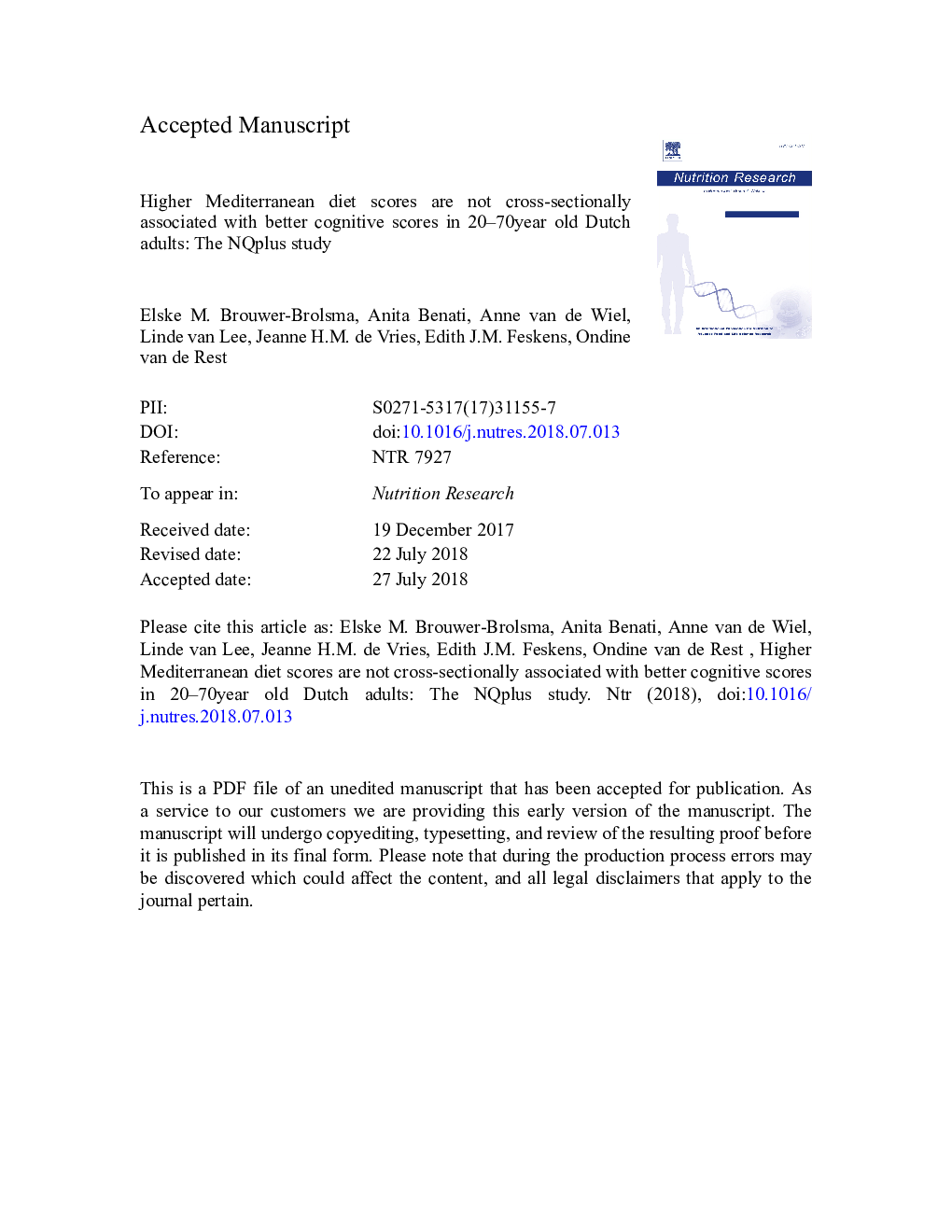| کد مقاله | کد نشریه | سال انتشار | مقاله انگلیسی | نسخه تمام متن |
|---|---|---|---|---|
| 9955306 | 1569086 | 2018 | 37 صفحه PDF | دانلود رایگان |
عنوان انگلیسی مقاله ISI
Higher Mediterranean Diet scores are not cross-sectionally associated with better cognitive scores in 20- to 70-year-old Dutch adults: The NQplus study
دانلود مقاله + سفارش ترجمه
دانلود مقاله ISI انگلیسی
رایگان برای ایرانیان
کلمات کلیدی
SDMTSymbol Digit Modalities TestFFQMMSELFTsRTCES-DLetter Fluency Testmild cognitive impairment - اختلال شناختی خفیفSquash - اسکواشPolyunsaturated fatty acids - اسید چرب اشباع نشدهPUFA - اسید چرب چند غیراشباعAlzheimer's disease - بیماری آلزایمرMediterranean diet - رژیم غذایی مدیترانهایbody mass index - شاخص توده بدنBMI - شاخص توده بدنیCognitive performance - عملکرد شناختیCenter for Epidemiologic Studies Depression Scale - مرکز مقیاس افسردگی مطالعات اپیدمیولوژیکObservational - مشاهداتیMini-Mental State Examination - معاینه دولتی مینی روانشناسیcross-sectional - مقطع عرضیMiddle-age - میانسالMCI - همراه اولfood frequency questionnaire - پرسشنامه فرکانس غذاMedDiet - پیچ و تاب
موضوعات مرتبط
علوم زیستی و بیوفناوری
بیوشیمی، ژنتیک و زیست شناسی مولکولی
علوم غدد
پیش نمایش صفحه اول مقاله

چکیده انگلیسی
Adherence to the Mediterranean Diet (MedDiet) has been suggested to reduce the risk of age-related cognitive decline. Therefore, we hypothesized that adults consuming a more Mediterranean-like diet were more likely to have better cognitive scores. We investigated cross-sectional associations between MedDiet adherence and cognitive performance using data of 1607 Dutch men and women aged 20-70 years. Dietary intake was assessed using a 183-item Food Frequency Questionnaire. MedDiet adherence was defined by a 0-9 point scale; which was based on intakes of vegetables, legumes, fruits/nuts, cereals, fish/seafood, meat/poultry, dairy, ethanol and the MUFA:SFA ratio. Cognitive function was assessed with a neuropsychological test battery. Linear regression analyses adjusted for relevant covariates showed a significant inverse association between MedDiet adherence and everyday memory: specifically β = â0.107 ± 0.046 points (P = .02) for the total population and β = â0.139 ± 0.055 points (P = .01) for those aged â¥50 years. Further exploration of the individual MedDiet food groups suggested that the association between MedDiet and every day memory was predominantly driven by the MUFA:SFA ratio. Moreover, associations were observed between higher ethanol intake with better semantic memory and language production (β = 0.016 ± 0.008 P = .05), higher vegetable intake with better processing speed (β = 0.005 ± 0.002, P = .02), and higher legumes intake with poorer processing speed (β = â0.014 ± 0.006, P = .03). Thus, in this Dutch cohort, higher MedDiet adherence was associated with poorer everyday memory.
ناشر
Database: Elsevier - ScienceDirect (ساینس دایرکت)
Journal: Nutrition Research - Volume 59, November 2018, Pages 80-89
Journal: Nutrition Research - Volume 59, November 2018, Pages 80-89
نویسندگان
Elske M. Brouwer-Brolsma, Anita Benati, Anne van de Wiel, Linde van Lee, Jeanne H.M. de Vries, Edith J.M. Feskens, Ondine van de Rest,